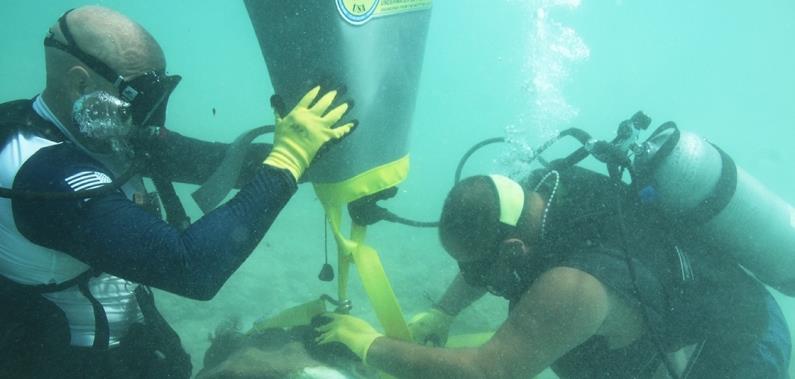
Operation: Coral Rescue is under way
by NOAA Fisheries 14 Dec 2017 12:52 UTC

Force Blue Divers underwater lifting coral heads © NOAA Fisheries
It might seem like an impossible mission, but NOAA found the right team to handle the job.
NOAA scientists have partnered with several organizations to help quickly assess damage to coral reefs in Florida and Puerto Rico following this year's very active hurricane season. One of those partners is Force Blue, a nonprofit group that gives former military combat divers opportunities to use their specialized training to assist with coral reef conservation.
Since October, seven members of the Force Blueoffsite link dive team, representing all branches of the U.S. military and the British Royal Marines, have been working with coral experts to identify and restore damaged coral reefs.
This underwater work can be difficult. But it's work these veterans have already mastered in the military: moving heavy objects – in this case, pieces of reef and equipment weighing thousands of pounds – and working in dark, murky conditions that are far from ideal. (Video: WATCH Force Blue team members work to restore damaged coralsoffsite link after Hurricane Irma swept through Florida.)
Force Blue program staff have also trained the vets to identify different types of fish and coral, observe marine life patterns and behavior, and take underwater photographs that can clearly document the state of individual corals and overall reef health.
"When confronted with the awesome, destructive power of a hurricane or the scale of the environmental challenges we face, it can be daunting," said Force Blue diver, medic and U.S. Army Veteran Nathan Quinn. "The training pushes you to ignore the obstacles and get to work. Then you see the team come together and the amazing people from NOAA giving all they have. Suddenly, everything seems possible. We can do this."
"We knew that just figuring out the scope of the damage to coral after the hurricanes was going to be a huge project and we looked to partners to help us," said Jennifer Koss, director of the NOAA Coral Reef Conservation Program. "As a member of a military family, I'm proud to have Force Blue onboard and welcome them to NOAA's coral reef conservation community."
In addition to conservation, Force Blue works to provide opportunities for trained specialists who are often struggling with post-traumatic stress and adapting to a civilian world that is very different than their former military role and environment.
"Working on this project with NOAA has shown us that our mission to restore lives and restore the planet is an achievable one and that, with proper support, we can be a force multiplier in the battle to preserve the world's marine resources," says Jim Ritterhoff, co-founder and executive director of Force Blue.
This rapid coral assessment and restoration effort is only the first step in repairing and restoring reefs damaged in the hurricanes. Coral reefs are an important part of the ocean ecosystem and support a vibrant tourism industry, provide jobs, and protect lives and valuable coastal infrastructure – these valuable natural resources generate billions of dollars a year for coastal economies.
This effort was supported in part by the National Fish and Wildlife Foundation and other partners.